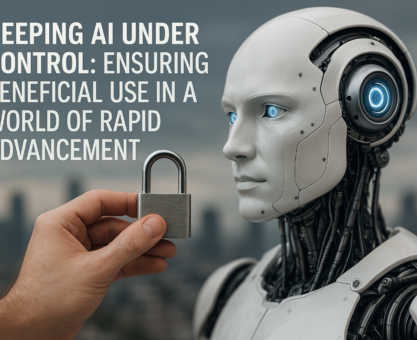The business landscape in 2025 is witnessing an unprecedented shift, largely propelled by the rapid advancements and increasing integration of
artificial intelligence (AI) into core operations.
Among the most profoundly affected areas are customer support and sales, where AI is not just an emerging technology but a
fundamental force reshaping interactions and driving growth.
This report delves into the pivotal role of AI in these domains, exploring:
- Current trends setting the stage for future advancements
- Popular tools and technologies businesses are actively deploying
- Tangible benefits already being realized by early adopters
Furthermore, it examines how AI is fundamentally transforming sales processes — from identifying potential leads to nurturing customer relationships and
accurately forecasting performance.
Through real-world examples of successful AI integration, this report offers a comprehensive look into the opportunities and challenges of leveraging AI
to enhance customer engagement and sales strategies.
Finally, it addresses the critical ethical considerations in deploying AI in customer-facing roles and highlights the trending keywords dominating
search engine queries — enabling businesses to effectively navigate this evolving technological landscape.
The Evolving Landscape of AI in Customer Support
The customer service sector is undergoing a significant evolution in 2025, with AI and automation taking center stage.
Human agents are not disappearing; instead, they are being augmented by increasingly sophisticated AI solutions that are
redefining the nature of customer interactions.
Key Trends and Advancements Shaping Customer Service in 2025
Increased adoption of AI and automation is a defining trend. AI assistants, chatbots, copilots, and virtual assistants have become
integral to contact center operations. Agentic AI solutions—capable of making autonomous decisions aligned with business goals—are
emerging, marking a shift toward self-sufficient customer service models.
Around 79% of contact center agents believe that having an AI assistant significantly enhances their abilities,
helping them resolve issues faster and more effectively.
Customers in 2025 are demanding omnichannel experiences, expecting seamless consistency across all service channels—voice, email, live chat, SMS, social media, and even extended reality.
Organizations must integrate their support systems to provide agents with a holistic view of the customer journey.
According to McKinsey, achieving complete consistency across all service channels will become an expectation, not a luxury, within the next five years.
Personalization is evolving into hyper-personalization. AI now enables real-time journey crafting using behavioral data, preferences, and predictive analytics.
It analyzes browsing history, purchases, social activity, and intent to deliver highly tailored experiences.
By 2025, hyper-personalized experiences are expected to drive up to 40% more revenue for retailers compared to non-personalized ones.
Agentic AI stands at the forefront of this evolution. It can autonomously take actions aligned with specific goals, handle complex requests,
and even initiate meaningful interactions without human prompting. For example, it can guide a customer in selecting a financial product or troubleshooting an issue.
Multimodal AI is also gaining traction. By understanding and processing text, images, audio, and video,
it delivers a deeper and more contextual understanding of customer needs—enabling more empathetic, effective interactions.
Lastly, the rise of AI is increasing the spotlight on trust and privacy. As customers become more aware of how their data is used,
organizations must carefully balance personalized service with robust data protection to maintain customer confidence.
The Tangible Benefits: Enhanced Efficiency, Personalized Experiences, and 24/7 Availability
Implementing AI in customer support offers tangible and measurable benefits.
Improved efficiency stems from automating routine tasks, which leads to faster response times and reduces the burden on human agents.
For instance, AI-powered agent assist tools can provide real-time suggestions, such as relevant knowledge base articles and pre-filled replies,
increasing first-contact resolution rates.
AI also facilitates personalized experiences by utilizing customer data, preferences, and interaction history to tailor support.
This includes personalized product recommendations or proactive outreach based on anticipated needs—creating a more engaging and valuable experience.
A major advantage is round-the-clock availability. AI chatbots and virtual assistants offer 24/7 support,
ensuring that customers receive immediate assistance anytime—enhancing both convenience and satisfaction.
Spotlight on Popular AI-Driven Tools and Technologies for Customer Support
A wide array of AI technologies are shaping customer support in 2025:
- AI chatbots and virtual agents: Powered by NLP, they handle routine queries, deliver instant answers, and escalate complex cases to humans—reducing wait times and frustration.
- Agent assist tools: These tools listen to live conversations and provide real-time suggestions—helping agents personalize interactions and resolve issues faster.
- Predictive analytics: Enables proactive support by analyzing past and real-time data to predict customer needs and prevent churn.
- Sentiment analysis: Detects emotions like frustration or satisfaction in real time, allowing agents to adapt and improve engagement.
- Workforce optimization: Uses AI to predict service demand and dynamically adjust staffing—ensuring the right agents are available at the right time.
Here are some of the most popular AI-powered support platforms in 2025:
- HappyFox AI: Offers AI Resolve and AI Agent Copilot for automated ticket handling.
- Zendesk AI: Known for intelligent triage, advanced bots, and streamlined workflows.
- Intercom’s Fin: Provides AI-powered conversation management and instant response generation.
- Freshdesk Freddy AI: Enhances ticket categorization, prioritization, and automation.
- Zoho Desk (Zia): Features a smart assistant that provides suggestions and analytics in real time.
- Other Notable Tools: Tidio, Kustomer, Clerk Chat, Help Scout, ScreenApp, SentiSum, Ada CX, CustomGPT, Chatling, BotPress, Chatsimple, Hiver, VocAI, Reply.io, TalkStack AI, SAAS First, Get Guru, Netomi, Certainly, Dixa, Zowie, Meya, KIQ Customer Assist, Balto, Convin, Guru, and Productboard.
AI’s Impact on the Modern Sales Process
The sales landscape in 2025 is being fundamentally reshaped by AI, with innovations transforming each stage of the sales cycle—from prospecting and forecasting to relationship management and outreach.
Exploring the Latest AI Innovations and Trends in Sales for 2025
- AI-powered sales prospecting: Advanced algorithms analyze vast datasets to uncover intent signals and behavioral patterns, allowing sales teams to target prospects with greater precision and efficiency.
- Go-to-market engineers: Replacing traditional sales ops roles, these technical experts optimize internal workflows and automation using AI-driven tools, ensuring scalable and agile sales strategies.
- Agentic lead generation: AI agents now handle multi-step processes—such as identifying ICPs (ideal customer profiles), researching contacts, and automating personalized outreach—redefining the role of SDRs and streamlining pipeline creation.
- AI-driven sales forecasting: Machine learning models analyze historical data and real-time inputs to provide accurate predictions, helping teams make informed decisions and proactively adjust their strategies.
- CRM enhancement: AI automates data entry, recommends next-best actions, and provides deep customer insights—empowering sales reps to work smarter and build stronger relationships.
- Personalized outreach: AI customizes messaging based on past interactions, behavior, and preferences—boosting engagement and helping reps deliver timely, relevant communication at scale.
Revolutionizing Lead Generation, CRM, and Forecasting with AI
AI is playing a central role in transforming key sales functions:
- Lead Generation: AI identifies high-quality leads, detects buying intent in real-time, and automates cold outreach—freeing reps to focus on high-value prospects and closing deals.
- Customer Relationship Management (CRM): By integrating insights across channels and automating administrative tasks, AI enables sales reps to deliver more consistent and personalized experiences—leading to improved loyalty and retention.
- Sales Forecasting: AI analyzes trends and historical patterns to predict revenue more accurately, supporting strategic planning, budgeting, and resource allocation.
Must-Know AI-Powered Tools and Platforms for Sales Teams
Sales teams in 2025 are leveraging a wide range of powerful AI tools, including:
- AI Sales Assistants: Regie.ai, Sandy AI (Salesmate), Apollo.io, Clay, Lavender — Automate lead research, email drafting, scheduling, and sales tasks.
- AI-Powered CRMs: Salesforce Einstein, HubSpot Sales Hub — Embed AI directly into CRM workflows, offering smart recommendations, auto-data capture, and analytics.
- Forecasting Platforms: Forecastio, Clari — Deliver accurate revenue projections and help guide data-driven sales strategies using AI modeling.
- Sales Engagement Platforms: Regie.ai, Salesloft, Outreach, Apollo.io — Automate and personalize outreach sequences to boost response rates and drive pipeline efficiency.
Success in Action: Real-World Case Studies of AI Integration
Numerous companies are successfully integrating AI into their customer support and sales strategies, achieving significant results.
Companies Achieving Excellence in Customer Support with AI
- Motel Rocks used Zendesk Advanced AI to deflect 43% of tickets, reduce ticket volume by 50% via self-service, and increase customer satisfaction by 9.44%.
- Camping World implemented IBM’s Arvee AI assistant, achieving a 40% boost in engagement, 33-second reduction in wait time, and 33% increase in agent efficiency.
- Telstra deployed Ask Telstra using Microsoft Azure OpenAI, resulting in 20% fewer follow-ups, 84% of agents reporting better interactions, and 90% feeling more effective.
- Ooredoo saw a 73% success rate in chatbot-driven conversations.
- Allstate found AI-generated emails to show more empathy than human responses.
- HotelPlanner.com‘s AI voice assistants handled 40,000 inquiries across 15 languages in one month.
- Octopus Energy used predictive AI to alert service teams of irregular energy usage patterns.
- Uniphore provided real-time sentiment analysis during sales calls for improved responses.
- Kotak Life automated inquiries via Haptik’s AI assistant.
- ServiceNow used AI to automate ticket routing, reducing resolution time.
- eye-oo automated 75% of conversations and generated $66,000+ using Tidio.
- Zalando saw a 23% rise in product clicks and 40% growth in wishlist additions via their AI assistant.
- Bella Santé also automated 75% of conversations and achieved $66,000+ in sales using Tidio.
- ADT Security Services boosted customer satisfaction by 30% and conversation handling by 45%.
- Endeksa cut wait times by 59% and gained 138% more leads using AI.
- Suitor automated 85% of customer service via an AI chatbot.
- Procosmet grew sales by 23% and generated over 100 leads/month using Tidio’s AI.
- Urban Company resolved 85–90% of queries using chatbots.
Leading Businesses Transforming Sales Strategies Through AI
- Takeda Oncology used AI for predictive analytics to guide sales team actions.
- ACI Corporation improved sales conversions from under 5% to 6.5%, and qualified leads from 45.5% to 64.1%.
- Devoteam Italy achieved 7x faster response times and 50% more inquiries handled without growing their team.
- Capgemini saw a 40% increase in sales-ready results and 4.8x more marketing-qualified leads via Aptivio.
- Rogers Communications reached 80% sales forecast accuracy and 90% loss prediction accuracy.
- Microsoft quadrupled lead-to-sales-qualified conversions from 4% to 18% with AI-based scoring.
- Wrike grew pipeline by 496% and increased bookings by 454% using Drift’s conversational AI.
- American Express improved fraud prevention and personalization, boosting engagement by 20%.
- UPS optimized delivery operations using AI.
- Coca-Cola increased sales by 2% and social media engagement by 870% via AI-driven marketing.
- Netflix‘s recommendation engine drives over 80% of watched content and reduces churn.
- Starbucks increased average order value and engagement by 20% with AI-driven app suggestions.
- Verizon used AI for customer retention and improved lifetime value.
- Cosabella‘s AI holiday campaign boosted sales by 40–60% without offering discounts.
- JP Morgan Chase increased ad CTRs by 450% with AI-generated copywriting.
Navigating the Challenges and Ethical Considerations of AI in Customer Interactions
While AI provides immense value, it comes with important challenges and ethical concerns:
- Data privacy and security: Businesses must ensure responsible use of sensitive customer data.
- AI bias: Poor training data can lead to discriminatory outcomes and must be carefully managed.
- Transparency: AI systems need to be explainable to build trust and accountability.
- Human touch: Empathy and personal interaction must be preserved in sensitive scenarios.
- Workforce impact: Businesses should prepare for potential job displacement by reskilling staff.
- Resistance to change: Employee buy-in and training are crucial for successful AI adoption.
- Balancing automation and oversight: Human review is necessary in complex and ethical situations.
Ethical priorities should include fairness, transparency, data protection, and ensuring human control over AI systems.








